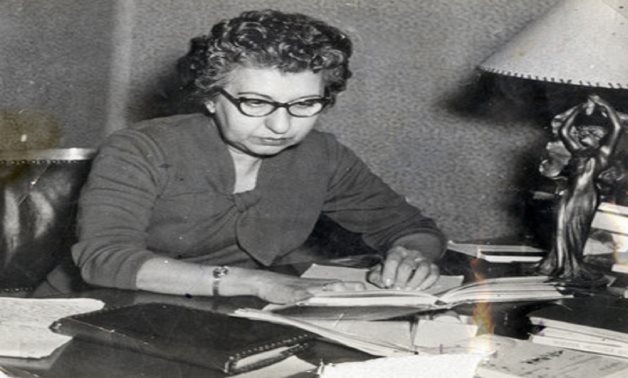Suhayr al-Qalamawi is an icon of literature and politics in the Arab world in general and in Egypt in particular.
She greatly influenced cultural life in Egypt and the Arab world and it was her idea to establish the Cairo International Book Fair.
Qalamawi was born in Cairo, in a family that focused on educating their daughters. Her father was a surgeon and her mother spoke various languages. This upbringing helped her complete her education, and she graduated from the American College for Girls in 1928.
Her father also played a major role in developing her linguistic and cultural skills. She excelled reading the holy Qur’an with her father. Qalamawi’s father also owned a library where she was able to feed her infinite hunger for reading.
She was able to benefit from her father’s vast library of works at an early age, and it seems that writers such as Taha Hussein, Rifa’a al-Tahtawi and Ibn Iyas greatly contributed to her literary talent and shaped her voice as a writer.
Her father encouraged her to specialize in Arabic literature, and she became the first young girl to attend Cairo University and the first woman among 40 men to study Arabic literature. After obtaining a Master of Arts, she then received a scholarship to conduct research in Paris for her Ph.D. in 1941. After the completion of her doctoral thesis, she became the first woman to obtain a doctorate from Cairo University.
During her educational career, she was influenced by a number of personalities, most notably the dean of Arabic literature Taha Hussein, who was head of the Arabic language department and editor-in-chief of the Cairo University Magazine at the time. He made her assistant editor-in-chief of the magazine in 1932, and Qalamawi became the first woman to obtain a permit to practice journalism in Egypt.
Suhayr al-Qalamawi started her career after graduation as the first female lecturer at Cairo University in 1936. Soon she became a university professor and later the head of the Arabic language department between 1958-1967, in addition to becoming the president of the Egyptian Feminist Union.
She became the president of the Egyptian General Authority for Cinema, Theater and Music in 1967 and the head of the Child Culture Society in 1968. Qalamawi was also the head of the administration of the General Egyptian Book Organization, from 1967 to 1971, and the head of the censorship authority from 1982 to 1985.
In addition, Qalamawi was able to make outstanding contributions within the cultural field. During her tenure as head of the General Egyptian Book Organization, she worked to expand the range of readers, encourage young writers, and advance the book industry in 1967. From here, she established the first book fair in the Middle East, which is the Cairo International Book Fair in 1967.
Suhayr al-Qalamawi’s contributions were not limited to the cultural community, but she also contributed to the struggle of women, in order to preserve their rights through her literary works, in addition to her participation in many conferences on Arab women, and in 1960, she was the president of the International Conference on Women.
Furthermore, Qalamawi’s journey was also full of political work, and the beginning was when she entered politics as a member of Parliament in 1958 , and was nominated again in the period from 1979 to 1984.
Qalamawi’s career was crowned with a number of awards, as she was awarded the Arabic Language Academy Award in 1954 and the State Appreciation Award in Youth Literature. She also received the State Encouragement Award, the State Appreciation Award in Literature, The First Class Order of the Republic, the Medal of Achievement, and an Honorary Doctorate from the American University in Cairo.
After an enriching career, Suhayr al-Qalamawi passed away in 1997.
source/content: egypttoday.com (edited)
________________

_________
EGYPT

